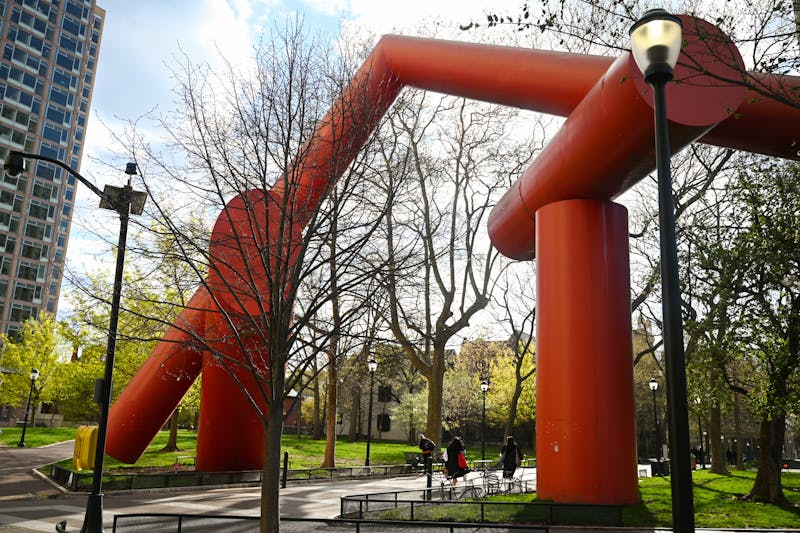
Two nights ago, the Penn men's basketball team clinched the Big 5 title outright, outlasting La Salle in an 81-76 overtime victory.
Not since a pair of all-Ivy first teamers, Ron Haigler and John Beecroft, roamed the Palestra hardwood for the five-time defending Ivy League championship Quakers in the 1973-74 season, were the Quakers city champs.
A proud accomplishment for sure, but does being the toast of Philadelphia amount to anything more than an ego booster and a potentially useful recruiting chip?
For starters, there is no additional reward besides city bragging rights and a nice trophy. No automatic NCAA Tournament berth, no guaranteed bid even to the less-prestigious National Invitational Tournament.
In fact, the game against La Salle failed to garner a single mention on any major sports website.
Yet, from a historical standpoint alone, there seems to be no question about the championship's importance, as each member of the Big 5 -- Temple, Villanova, St. Joe's, La Salle -- is well-equipped in tradition.
The Owls have made the NCAA Tournament 17 of the last 19 years and are annually ranked in the top 25. In that span, Temple has seen such basketball greats as Big 5 Hall of Fame members, Mark Macon, Aaron McKie and Eddie Jones don the Cherry and White.
The Wildcats too have boasted a fair share of names and historical accolades. One such great, Ed Pinckney, led a "David over Goliath" upset, defeating heavily favored Georgetown, 66-64, in the 1985 NCAA Championship. Besides scoring 16 points and collecting six rebounds, Pinckney also limited Hoyas' frontcourt behemoth and Naimsith Award winner Patrick Ewing in the title game.
Arguably the least accomplished of the Big 5, St. Joe's has been a program on the rise as of late. Since Phil Martelli took over the coaching reigns in 1995, St. Joe's has made the NCAA tournament twice, making the Sweet 16 in 1996-97 and nearly pulling an upset last year over No. 1 seed Stanford. The Hawks were NIT runner-up in Martelli's first year.
And finally, there's La Salle. While the Explorers have struggled to reach the postseason recently, between 1980 and 1990, La Salle earned five berths to the NCAAs. With the No.3 all-time leading scorer in NCAA history Lionel Simmons anchoring the Explorers' attack, La Salle made three consecutive NCAA appearances from 1988-1990. In 1990 the Explorers went 30-2.
And this season, Penn beat them all. The bragging rights belong to them, but is an NCAA tournament in the Red and Blue's grasp, as well?
It just may be. In fact, winning the Big 5 may have put the Quakers in a strong position to grab an at-large NCAA tournament berth, if they can win at least 10 Ivy League contests.
That's right. Penn might not even need the Ivy's auto bid to make the NCAAs. A second-place finish might just do.
While this will not be easy given the tremendous amount of parity in the Ancient Eight, as four teams -- Penn, Brown, Harvard and Princeton -- could come away with the title this season, it is certainly feasible for the Quakers.
In the most recent online chat held by ESPN "Bracketology" expert Joe Lunardi on Jan. 25 , the college hoops expert was asked if the Quakers were to finish second in the Ivy League, would Penn have a legitimate shot to garner a spot at the Big Dance.
His answer, "I doubt it, although it would be very close. [But] Penn probably needs to split with St. Joe's."
Consider it close. Lunardi's chat was held before the Quakers 62-60 victory over the Hawks last Saturday and prior to Penn's City Series title.
Maybe Big 5 victories are worth something.
Next justification for a tourney berth is the Quakers' Rating Percentage Index. A standard used to equate college basketball teams throughout the nation and a critical tool for selecting the NCAA tournament field, the RPI is derived from three components -- Division I winning percentage, strength of schedule and opponent's strength of schedule.
Penn currently ranks No. 53 in the RPI standings, placing them ahead of probable NCAA teams Missouri, Wisconsin and Michigan State.
The numbers don't lie.
Take into account the Ivy League is ranked in the middle-of-the-pack in the conference-RPIs, and you have an argument developing.
The easiest thing, of course, is for the Quakers to win the conference and forget about the numbers. Certainly another loss to Harvard won't cut it and neither will dropping pairs of games to either Princeton or Brown.
With the strength of the Big 5 championship behind them and some impressive RPI numbers to boot the Quakers can make a case to be an NCAA tourney team. But Penn shouldn't deal in maybes.
Win the conference, then we'll talk about the NCAAs for sure.
The Daily Pennsylvanian is an independent, student-run newspaper. Please consider making a donation to support the coverage that shapes the University. Your generosity ensures a future of strong journalism at Penn.
DonatePlease note All comments are eligible for publication in The Daily Pennsylvanian.








